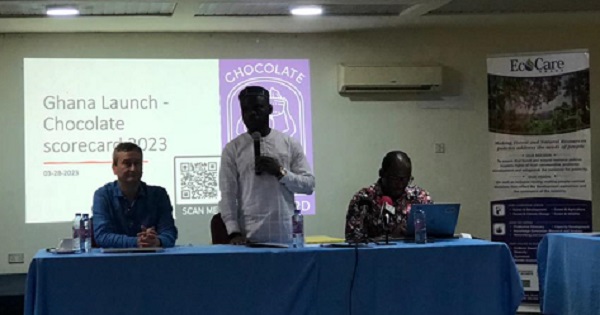
Group calls for regulatory framework to protect incomes of cocoa farmers
The manager campaigner of EcoCare Ghana, Obed Owusu-Addai, has said there is the need for a good regulatory framework to safeguard the interest of cocoa farmers in the country.
According to him, farmers over the years have been deprived of what he described as fair pricing of the cocoa beans they sell, a development which often demoralises them and affects their livelihood.
That, he said, had led to a wide income gap between cocoa farmers and chocolate producers.
Mr Owusu-Addai was speaking at the launch of the fourth edition of the Chocolate Scorecard in Accra.
The scoreboard surveyed the world’s biggest chocolate companies to find out how they are addressing key challenges in the Cocoa-chocolate value chain.
Mr Owusu-Addai said, “It’s time for the cocoa farmers to send a strong message to the international buyers, regulator and other stakeholders in the cocoa sector about their plight”.
“How can the farmer who produces the commodity that generated about $110 billion in 2021 alone still receive less than 10 per cent of the value of that commodity? he quizzed.
“We need to close that gap between the $10 billion cocoa industry and the $150 billion chocolate industry,” he added.
Chocolate scoreboard
This year’s scorecard ranked 83 of the largest chocolate companies (brands), retailers and processes on their performance in six sustainability categories namely Traceability, Transparency, Child Labour, Living Income, Deforestation and Climate, Agroforestry and Chemical Management.
It was led by three research institutions - the Macquire University Sydney, The Open University, UK, and the University of Wollongong and coordinated by Be Slavery Free (Australia) with support from a global coalition of NGOs including Green America, INKOTA, Mighty Earth, EcoCare Ghana and the National Wildlife Federation.
According to the scoreboard, some companies were rising to the challenge, while others continued to ignore consumer demand for chocolate that is free of child labour, poverty, deforestation among other things.
It said sustainability claims made by companies were defined narrowly to refer only to their programmes, which may foster sustainable practices but do not refer to the actual status of their cocoa or necessarily improve the actual living conditions of cocoa farmers.
Fair pricing
For his part, a Senior Director at Mighty Earth, Julian Oram, criticised how cocoa farmers in Ghana are not earning enough despite playing a very important role in the booming chocolate industry.
“Ghana is obviously one of the world’s leading producers of cocoa.
So many of the companies that we surveyed buy cocoa directly from Ghana for their chocolate manufacturing so of course, the findings from this scoreboard have relevance to Ghanaian farmers and traders,” he said.